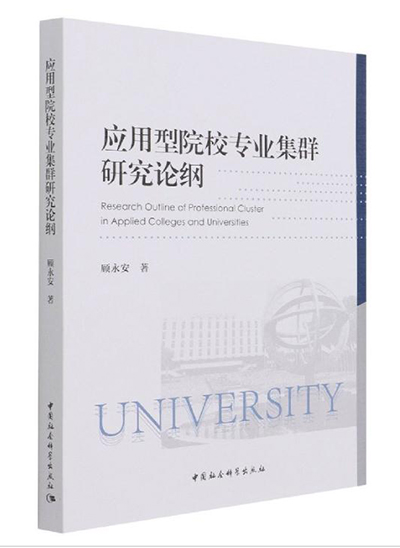Professional clusters in application-oriented universities

Research Outline of Professional Cluster in Applied Colleges and Universities
Research Outline of Professional Cluster in Applied Colleges and Universities, written by Gu Yong’an, a professor from the Research Center for Application-Oriented Universities at the Changshu Institute of Technology, focuses on the professional clusters of application-oriented colleges and universities and aims to solve the theoretical and practical problems of professional cluster construction, innovatively building a theoretical system in the field.
Confirming their multidisciplinary nature, Gu studies the characteristics and laws of professional clusters and industrial clusters from higher education, industrial economics, and social management, seeking theoretical support for the practical exploration of professional clusters.
The book highlights the two key interconnected elements of professional clusters in applied colleges, namely, “externally connecting industrial clusters and internally linking professional structures.” It also captures the prominent feature of professional cluster construction that “hinges upon industrial development and at the same time possesses scholarship.” In the context of application-oriented colleges and universities docking the new forms and new trends of the national innovation-driven strategy, the book further extends and innovates professional cluster research, conceiving the concepts of professional disciplinary clusters, and super platforms of professional disciplinary clusters, or a “big warship” strategy.
In Gu’s view, the professional disciplinary cluster is a concept extended upon professional clusters and disciplinary clusters. It organizes disciplines of the same level and majors with the same or related disciplinary base in accordance with different knowledge systems and the needs of the social-occupational division of labor, forming an organic collection featuring mutual penetration, mutual intersection, mutual support, and mutual reliance.
Considering the absence of an evaluation index system of professional cluster construction in applied colleges and universities, the book preliminarily sets up a validity evaluation system that allows for continuous improvements. The system is particularly characterized by the systematization of evaluation, whose evaluation idea, index system, and evaluation standard constitute a clear hierarchical and interrelated logical relationship.
For example, the author establishes the basic guidance for the effectiveness evaluation of professional cluster construction from the four dimensions of policy, value, innovation, and performance, taking into account evaluation ideas that support services for localities, cultivate tailored talent that meets social needs, improve the effectiveness of resource allocation, and bring good reputation for brand influence. Thus from the four angles of top-level design, connotation construction, mechanism innovation, and outcome output, the suggestion framework is given for the validity evaluation system of professional cluster construction.
Cai Jingmin is secretary of the Party Committee and a professor at Anhui University.
Edited by YANG LANLAN
